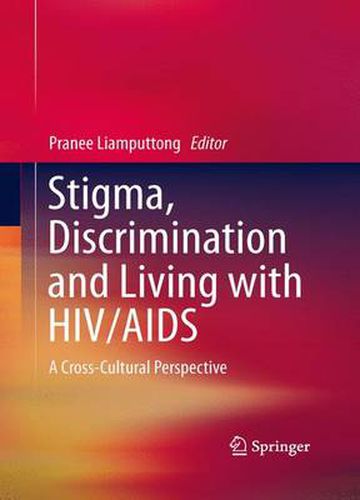Readings Newsletter
Become a Readings Member to make your shopping experience even easier.
Sign in or sign up for free!
You’re not far away from qualifying for FREE standard shipping within Australia
You’ve qualified for FREE standard shipping within Australia
The cart is loading…






This title is printed to order. This book may have been self-published. If so, we cannot guarantee the quality of the content. In the main most books will have gone through the editing process however some may not. We therefore suggest that you be aware of this before ordering this book. If in doubt check either the author or publisher’s details as we are unable to accept any returns unless they are faulty. Please contact us if you have any questions.
Up until now, many articles have been written to portray stigma and discrimination which occur with people living with HIV/AIDS (PLWHA) in many parts of the world. But this is the first book which attempts to put together results from empirical research relating to stigma, discrimination and living with HIV/AIDS. The focus of this book is on issues relevant to stigma and discrimination which have occurred to individuals and groups in different parts of the globe, as well as how these individuals and groups attempt to deal with HIV/AIDS. The book comprises chapters written by researchers who carry out their projects in different parts of the world and each chapter contains empirical information based on real life situations. This can be used as an evidence for health care providers to implement socially and culturally appropriate services to assist individuals and groups who are living with HIV/AIDS in many societies. The book is of interest to health care providers who have their interests in working with individuals and groups who are living with HIV/AIDS from a cross-cultural perspective. It will be useful for students and lecturers in courses such as anthropology, sociology, social work, nursing, public health and medicine. In particular, it will assist health workers in community health centres and hospitals in understanding issues related to HIV/AIDS and hence provide culturally sensitive health care to people living with HIV/AIDS from different social and cultural backgrounds. The book is useful for anyone who is interested in HIV/AIDS-related stigma and discrimination in diverse social and cultural settings.
$9.00 standard shipping within Australia
FREE standard shipping within Australia for orders over $100.00
Express & International shipping calculated at checkout
This title is printed to order. This book may have been self-published. If so, we cannot guarantee the quality of the content. In the main most books will have gone through the editing process however some may not. We therefore suggest that you be aware of this before ordering this book. If in doubt check either the author or publisher’s details as we are unable to accept any returns unless they are faulty. Please contact us if you have any questions.
Up until now, many articles have been written to portray stigma and discrimination which occur with people living with HIV/AIDS (PLWHA) in many parts of the world. But this is the first book which attempts to put together results from empirical research relating to stigma, discrimination and living with HIV/AIDS. The focus of this book is on issues relevant to stigma and discrimination which have occurred to individuals and groups in different parts of the globe, as well as how these individuals and groups attempt to deal with HIV/AIDS. The book comprises chapters written by researchers who carry out their projects in different parts of the world and each chapter contains empirical information based on real life situations. This can be used as an evidence for health care providers to implement socially and culturally appropriate services to assist individuals and groups who are living with HIV/AIDS in many societies. The book is of interest to health care providers who have their interests in working with individuals and groups who are living with HIV/AIDS from a cross-cultural perspective. It will be useful for students and lecturers in courses such as anthropology, sociology, social work, nursing, public health and medicine. In particular, it will assist health workers in community health centres and hospitals in understanding issues related to HIV/AIDS and hence provide culturally sensitive health care to people living with HIV/AIDS from different social and cultural backgrounds. The book is useful for anyone who is interested in HIV/AIDS-related stigma and discrimination in diverse social and cultural settings.